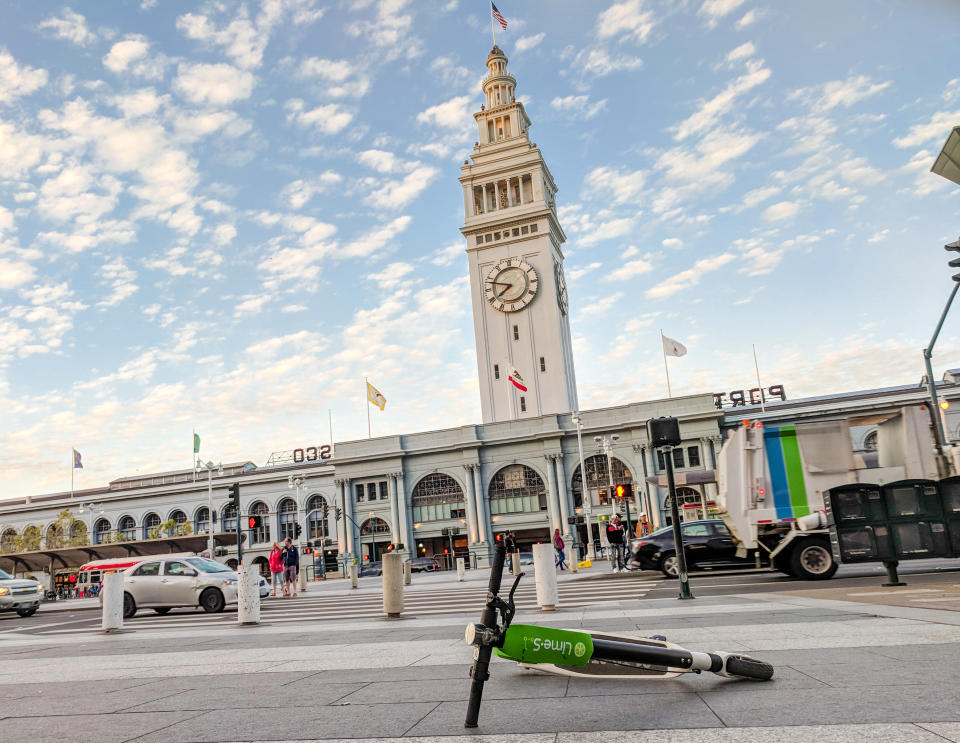Why 9 people are suing the e-scooter industry
Electric “e-scooter” operators Bird (BIRD) and Lime, and manufacturers Xiaomi and Segway, are facing a new California class action claiming that the companies are responsible for personal injuries and property damage.
Nine named plaintiffs in the Los Angeles County case filed Friday say the electronic scooter companies “aided and abetted assault,” were negligent in ensuring scooter safety, breached implied warranties, and created public nuisance by “dumping” thousands of scooters onto streets, sidewalks and other public places.
Seven of the plaintiffs say they suffered physical injuries — of those claimants, three allege riders crashed into them; three say they tripped over scooters left on sidewalks; and one, a rider, says he crashed when his scooter’s accelerator became stuck in the locked position.
A handicapped plaintiff claims that on multiple occasions she was prevented from using handicapped parking spots that were blocked by defendants’ scooters. Another plaintiff says his car was damaged by a scooter and rider that crashed into his vehicle.
Catherine Lerer, an attorney representing the class, says she reached out to scooter companies on behalf of her clients before filing the class action lawsuit.
Who’s to blame?
“Based on my experience, so far the companies have denied claims. We’ve received nothing but denials of liability,” she said.
Under the user agreements for Bird and Lime, riders agree to sole responsibility for damages, injuries and claims that arise as a result of using scooter services. In theory, if the user agreements hold sway, those who are injured by riders must rely on riders for compensation.
“I get calls over and over again from scooter riders saying the brakes fail, the throttle is sticking in the fully depress position, tire issues, or the handlebar post is collapsing,” Lerer said.

According to Lerer, the majority of e-scooters that Bird and Lime currently have on the street were not made to withstand commercial use, and are not being maintained to commercial standards.
“They are subject to abuse,” she said. “They are consumer grade scooters that are being used commercially. They were not meant for repeated use by the public.”
That’s where the manufacturers come in.
The lawsuit alleges that Segway and Chinese firm Xiaomi sold scooters to Lime and Bird, respectively, that were “not intended for use or repeated use in or on Public Places,” and “not suitable” for the way they were used by Bird and Lime.
In response to the action, Bird said, “There is no evidence that riding an e-scooter presents a greater level of danger to riders than riding a bike,” adding “Cars remain the greatest threat to commuters, killing over 40,000 people in the U.S. yearly.”
Bird said the class action, which names four defendants, had been “brought against the entire e-scooter industry.”
“Shared e-scooters have now become a relied upon transportation mode for hundreds of thousands of people in over 100 cities worldwide,” the company said.
Lime, in its response, said it was in the process of reviewing the complaint.
“While we don’t comment on pending litigation, safety has always been at the very core of everything we do at Lime,” the company said.
Scooters versus bikes
Both Bird and Lime stressed a commitment to promoting clean energy and reducing the number of cars.
When asked how she compares the shared bike market to the shared scooter market, Lerer says that docking and design make bikes safer.
“The dockless nature of scooters presents a real problem for pedestrians,” she said.
“Left in the middle of sidewalks, they create a real tripping hazard.”
“We also have a forensics safety engineer and he’s explained [scooters] are more dangerous than bikes because they have a higher center of gravity, smaller wheels, and smaller wheel base, so if you go over a sidewalk where they are not supposed to be you are much more likely to lose control.”
On October 19, Lime announced upgrades to its scooter fleet. The changes include larger 10” diameter wheel said to improve rider stability by increasing grip on the road. Bird, in June, told The Verge it was working on a “more ruggedized” scooter.
Lerer says the goal behind the class action is safety.
For example, she would like to see safety inspections performed between every use.
“We don’t want to ban scooters completely,” she said. “We just want to make it safer.”
—
Alexis Keenan is a reporter for Yahoo Finance.
Read more:
Big Pharma: Trump rule mandating drug prices in TV ads might be unconstitutional
Here’s how eBay alleges Amazon illegally lured its ‘high-value’ sellers
